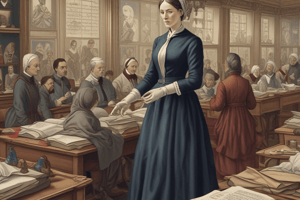Podcast
Questions and Answers
Who is credited with the commencement of professional nursing?
Who is credited with the commencement of professional nursing?
- Nightingale (correct)
- Virginia Henderson
- Dorothea Orem
- Hildegard Peplau
What was a primary focus of the Curriculum Era in nursing education?
What was a primary focus of the Curriculum Era in nursing education?
- Standardized curriculum development (correct)
- Research methodologies
- Practical hospital training
- Theoretical knowledge
Which concept became a focal point during the Research Emphasis Era?
Which concept became a focal point during the Research Emphasis Era?
- Curriculum content
- Apprenticeship training
- Clinical practice
- Degrees in higher education (correct)
During which era did master's degree programs in nursing first emerge?
During which era did master's degree programs in nursing first emerge?
What did Fawcett propose as a structure for nursing theoretical frameworks?
What did Fawcett propose as a structure for nursing theoretical frameworks?
What was a key goal of nurse researchers during the Graduate Education Era?
What was a key goal of nurse researchers during the Graduate Education Era?
Which aspect did the Theory Era emphasize?
Which aspect did the Theory Era emphasize?
What concept is NOT regarded as a part of Fawcett's nursing metaparadigm?
What concept is NOT regarded as a part of Fawcett's nursing metaparadigm?
What function does nursing theory serve in the profession according to Meleis?
What function does nursing theory serve in the profession according to Meleis?
Middle Range Theory is characterized by which of the following?
Middle Range Theory is characterized by which of the following?
Flashcards are hidden until you start studying
Study Notes
History of Nursing Theory
- Professional nursing's development commenced with Florence Nightingale's contributions and visions.
- Nursing evolved separately from medical knowledge, establishing a foundation for practical nursing guidance.
- Early nursing education relied on apprenticeship and specific hospital practices, prioritizing vocational experience over professional standards.
- A concerted effort arose to create specialized nursing knowledge that underpins nursing practice.
Curriculum Era
- This era focused on identifying the necessary content for nursing education.
- Aims included the establishment of a standardized nursing curriculum across educational institutions.
- The shift from hospital-based diploma programs to academic college-based nursing education began to take shape.
Research Emphasis Era
- Focused on integrating research processes to develop substantial knowledge that informs nursing practice.
- Higher education credentials became more prevalent, promoting nursing research and integrating research courses into nursing curricula.
- Significant advancements included:
- Standardized master's degree curricula established by the National League for Nursing.
- Initiatives for doctoral education specifically tailored for nursing.
Graduate Education Era
- Emerged alongside the emphasis on research, highlighting the need for specialized clinical training through master's programs.
- Key elements of curriculum development included:
- Exploration of nursing models and theoretical frameworks.
- Recognition of early nursing theorists and the knowledge development process.
- The baccalaureate degree gained acceptance as the standard educational level for professional nursing.
- Goals for nurse researchers encompassed:
- Enhancing patient care quality.
- Establishing professional nursing practices.
- Securing acknowledgment of nursing as a distinct profession.
- Nursing transitioned from a vocational identity to a recognized profession, with theory emphasized as essential for education and practice.
Theory Era
- A natural evolution from prior educational and research advancements led to a focus on the development and testing of nursing theories.
- Emergence of theoretical frameworks facilitated the organization of nursing knowledge, propelled by concepts introduced by Fawcett's metaparadigm.
- Four key metaparadigm concepts in nursing were established:
- Person
- Environment
- Health
- Nursing
- This classification provided cohesion among various nursing theoretical works.
- Emphasis shifted towards applying nursing theories to generate research inquiries, guide practical approaches, and structure nursing curricula.
- Theory development became a hallmark of professional practice and academic growth, fostering higher education pursuits among nurses.
Studying That Suits You
Use AI to generate personalized quizzes and flashcards to suit your learning preferences.




